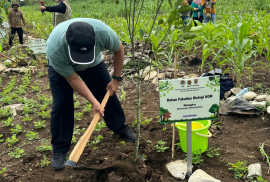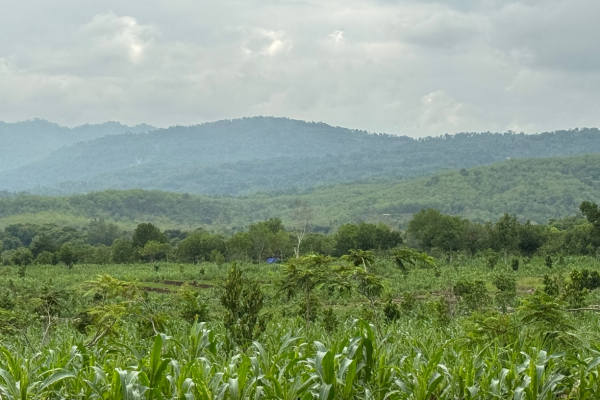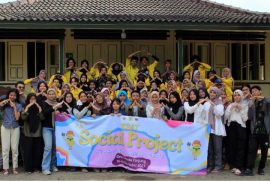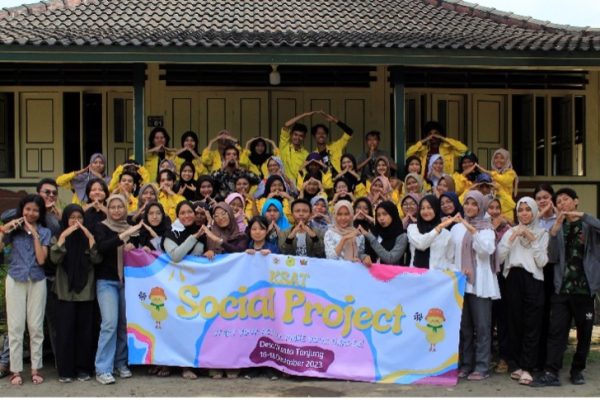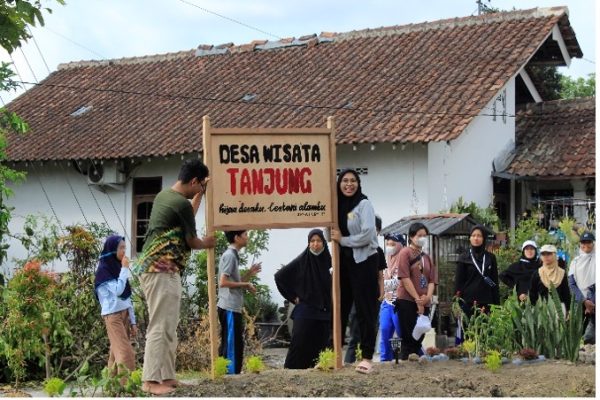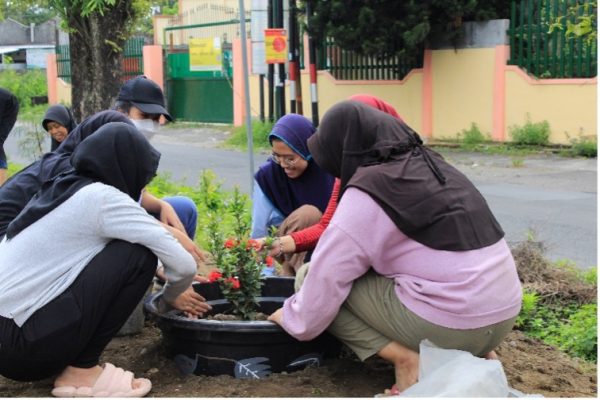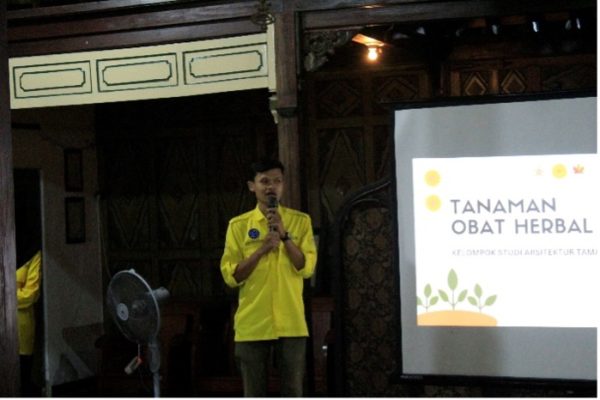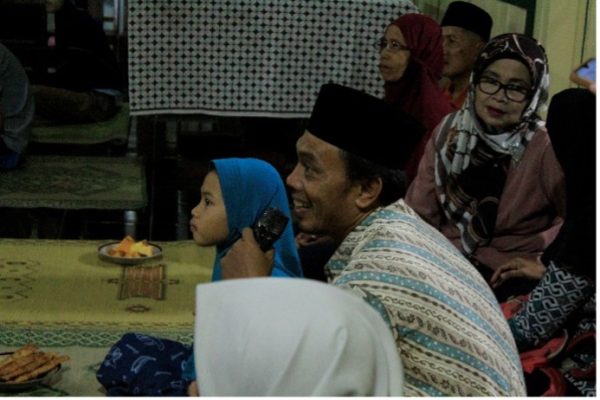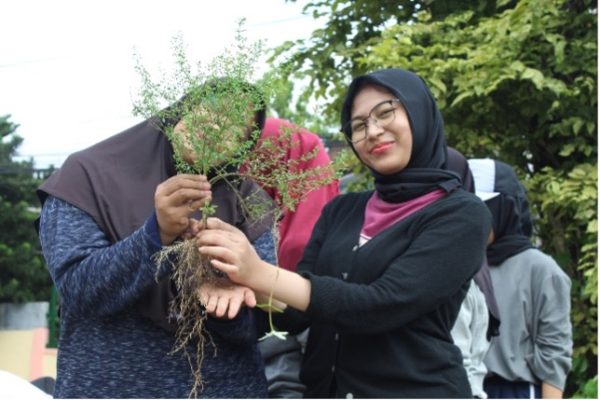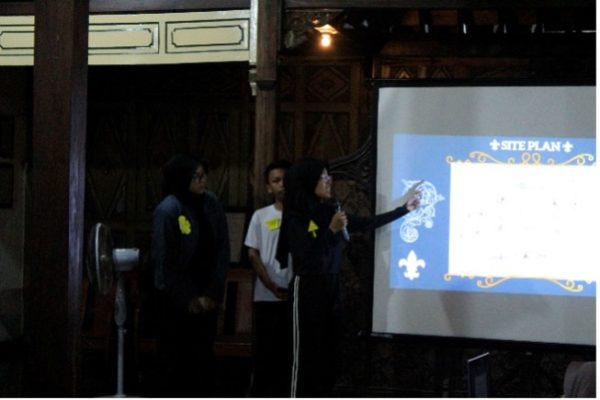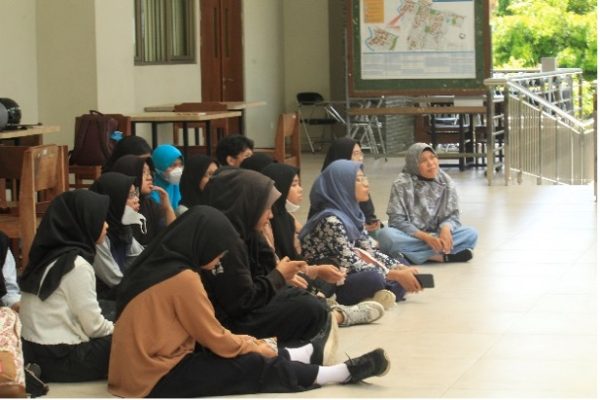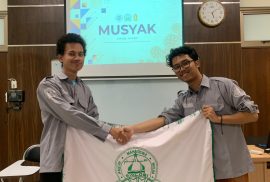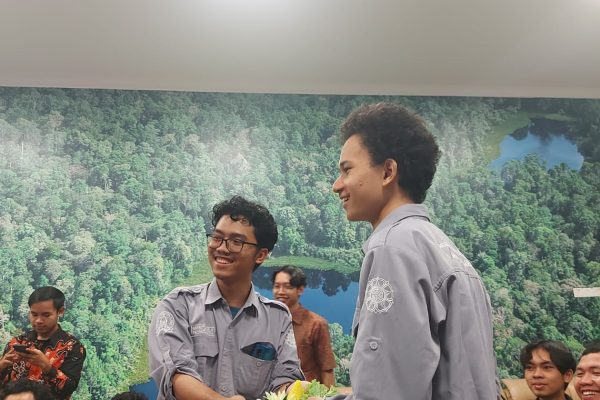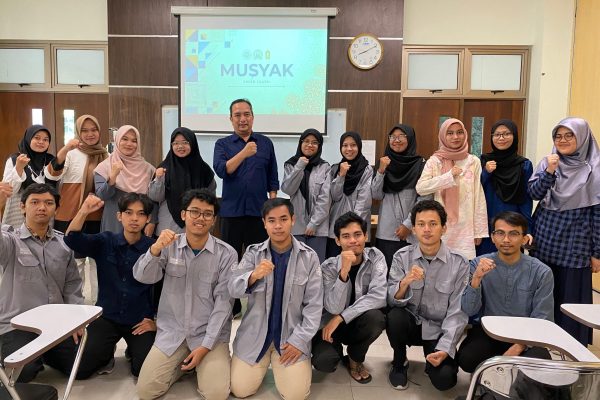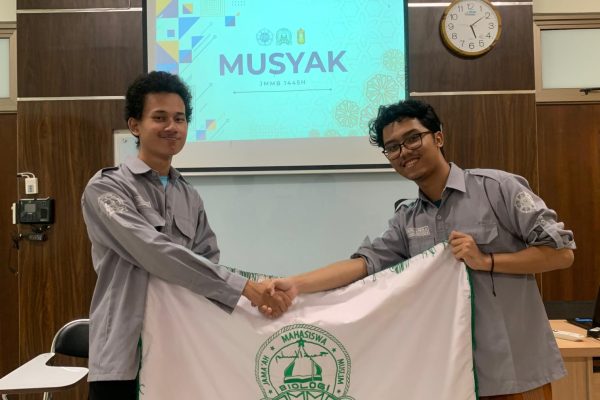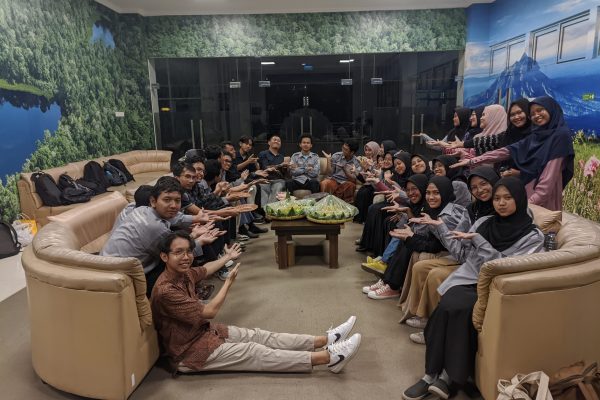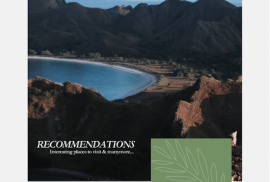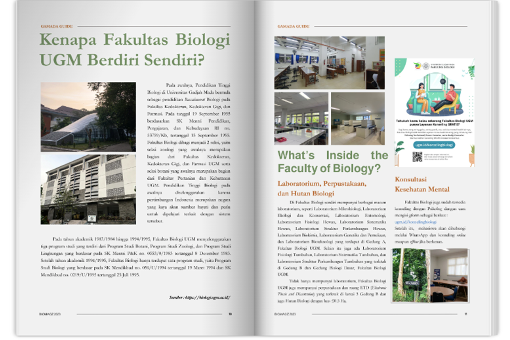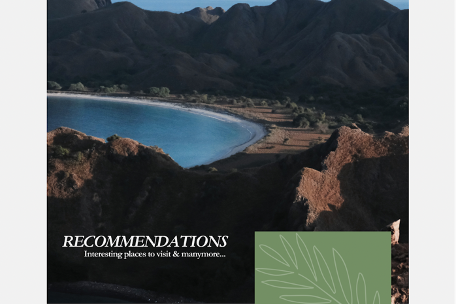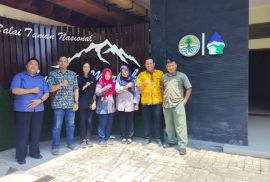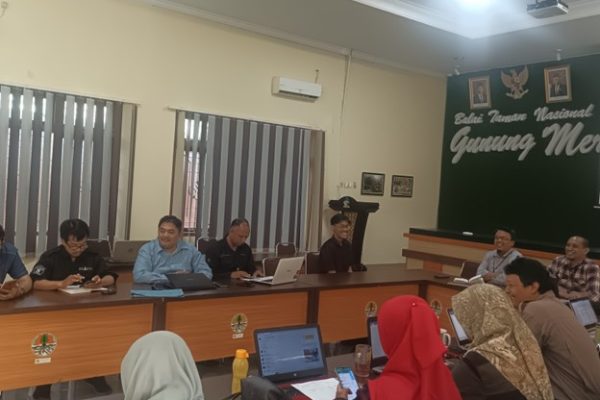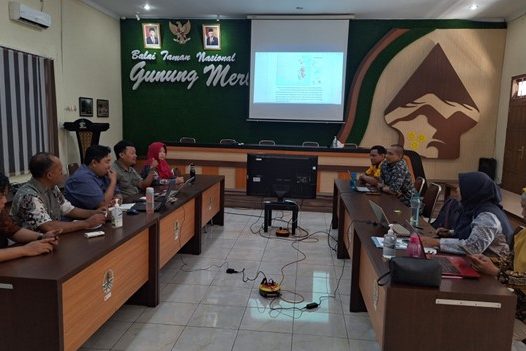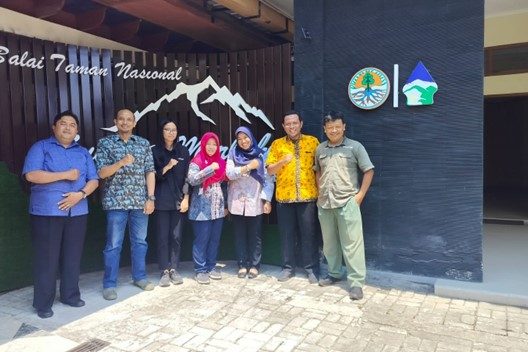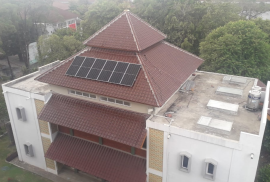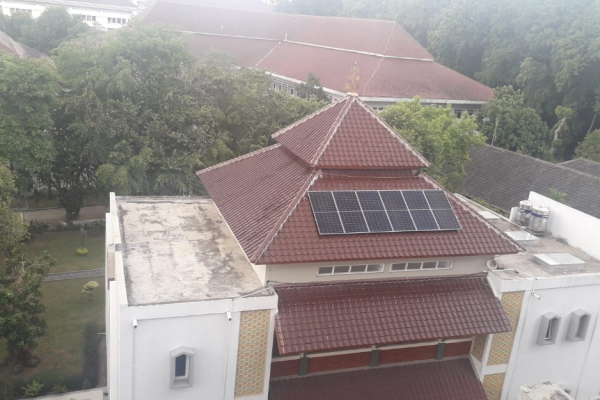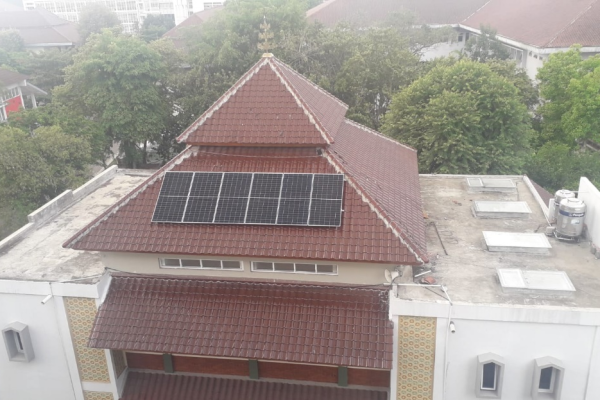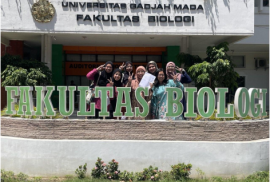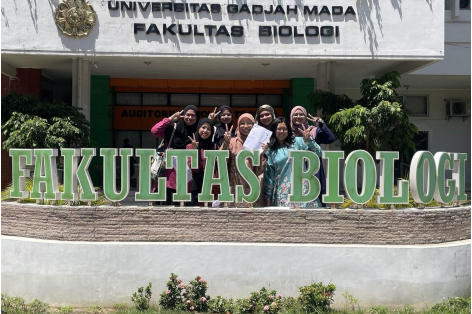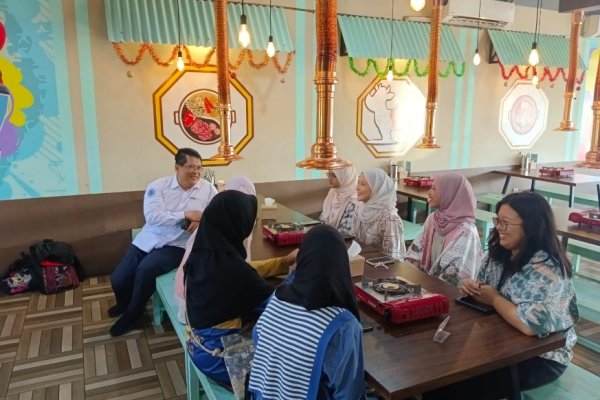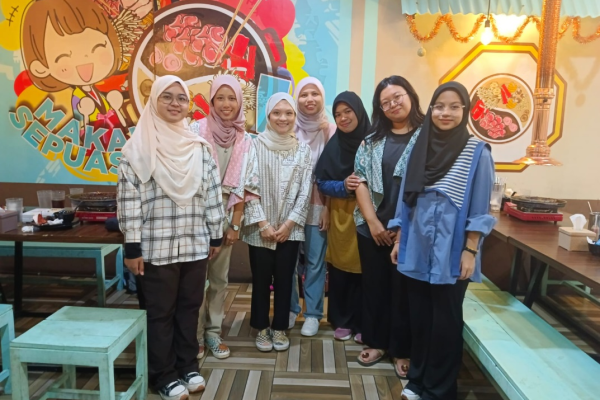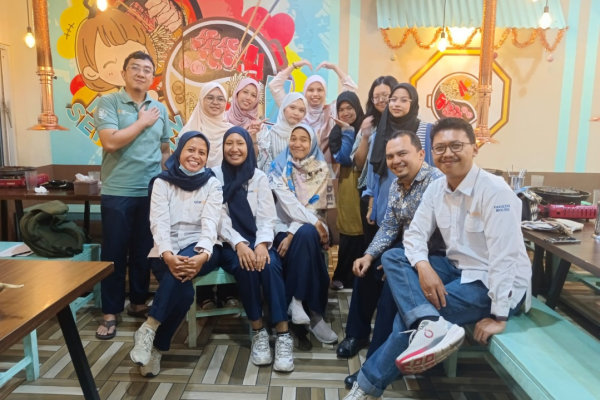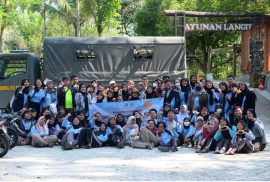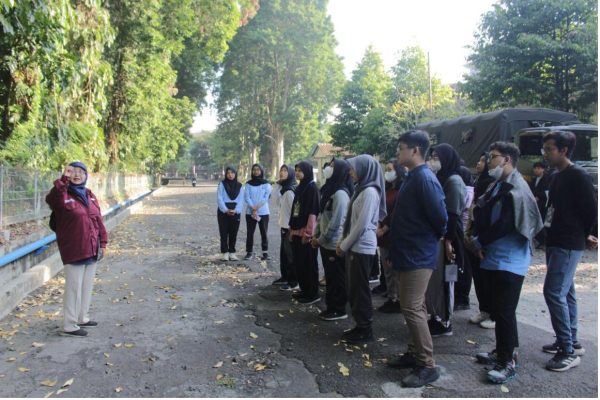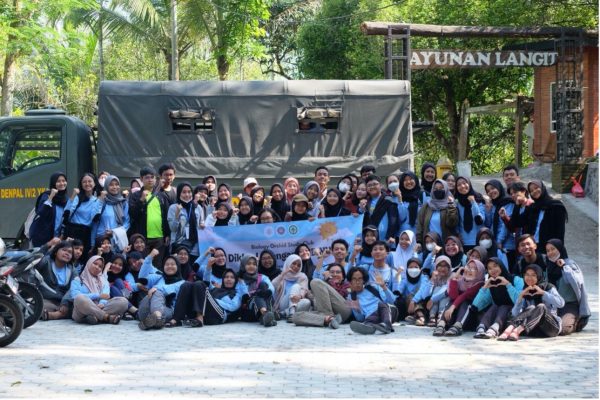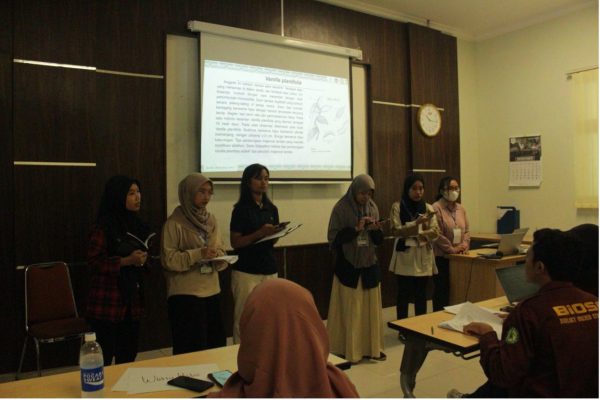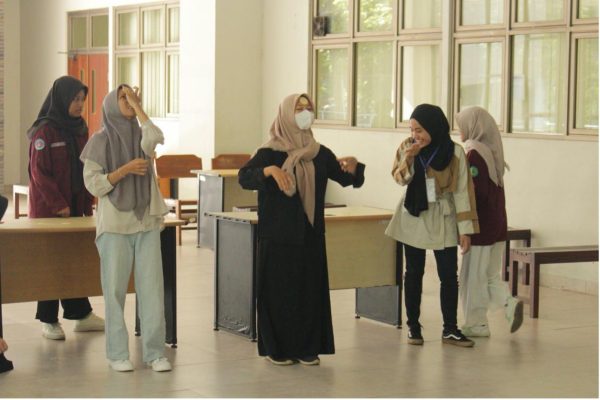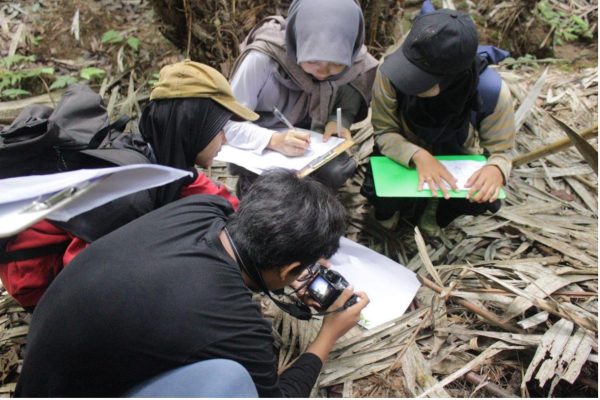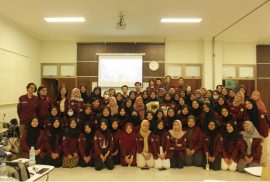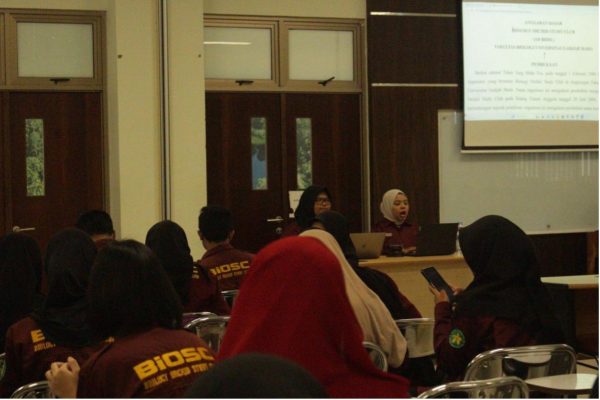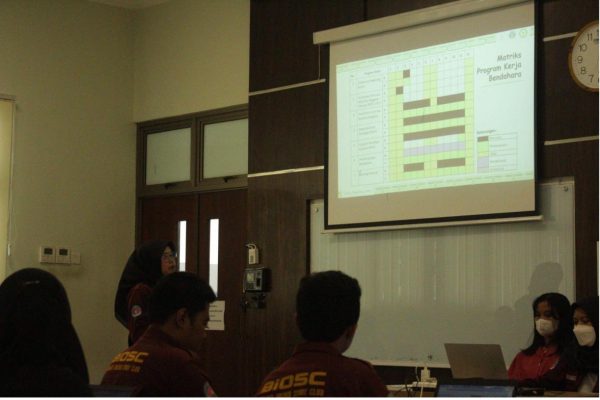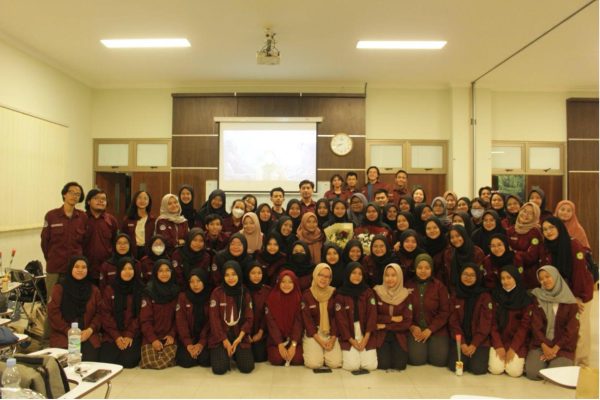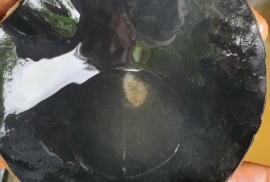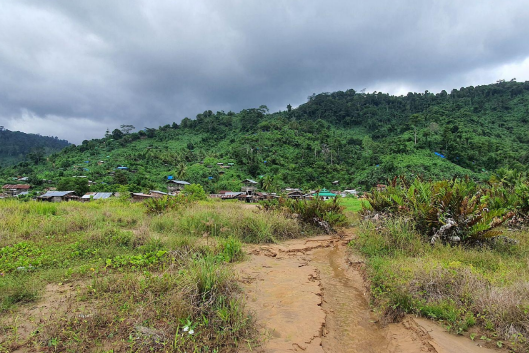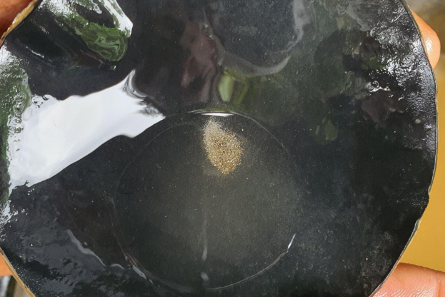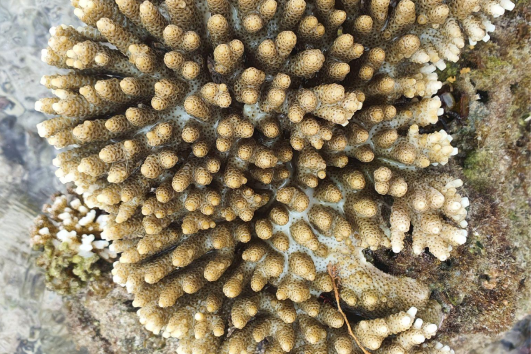Arsip:
News Release
Yogyakarta, December 30, 2023 – The Faculty of Biology at Gadjah Mada University (UGM), represented by the Vice Dean for Academic and Student Affairs, Dr. Bambang Retnoaji, M.Sc, actively participated in the nationwide tree planting initiative initiated by the Ministry of Environment and Forestry (KLHK) across Indonesia. The tree planting took place on Saturday, December 30, 2023, and was led by officials from KLHK at both the central and regional levels. The event was held in the area of plot 58 rph Candi BDH Karangmojo, Yogyakarta Forest Management Unit (KPH Yogyakarta).
The tree planting activity is part of a national program announced by the Secretary-General of the Ministry of Environment and Forestry of the Republic of Indonesia. The Faculty of Biology at UGM contributed by planting jackfruit trees, with the hope that they would become a commodity for the production of traditional food, gudeg. Additionally, this effort aims to strengthen land use and provide a future source of animal feed.
The participation of the Faculty of Biology UGM in this event aligns with the goals of Sustainable Development, particularly supporting the achievement of the Sustainable Development Goals (SDGs), including: SDGs Goal 2, Zero Hunger: Through the planting of jackfruit trees, it is expected to contribute to fulfilling food needs, especially as a key component in the production of traditional food such as gudeg.
SDGs Goal 12, Responsible Consumption and Production: Planting trees as part of the KLHK initiative is a positive step towards sustainable consumption and production. SDGs Goal 17, Partnerships for the Goals: Active collaboration between the Faculty of Biology UGM and KLHK demonstrates a shared commitment to achieving sustainable development goals.
By participating in this activity, the Faculty of Biology UGM reaffirms its role in supporting environmental conservation efforts and food resilience as an integral part of sustainable development in Indonesia.
On Saturday to Monday, December 16-18, 2023, the final series of events for the KSAT Open Recruitment, namely the Social Project, was conducted. The purpose of organizing this Social Project was the training of prospective seedlings into members of KSAT 2023. The Social Project activities took place in Tanjung Tourism Village, with the main activity being the creation of gardens on 2 designated plots.
The Social Project spanned over 3 days. On the first day, the activities included a departure to Tanjung Tourism Village, Garden Survey, Presentation on Medicinal Plants, and Garden Design Presentation. The second day involved Design Execution, Presentation of Garden Results, and Awards for various Seedling Categories. The third day featured Games Session, the Closing of the Social Project, and the return from Tanjung Tourism Village. Each event was led by Sefilla Musdalifah (KSAT 2021) and Nirmastu Lintu (KSAT 2022) as the MC.
The Social Project activities of KSAT 2023 ran smoothly and on schedule. This initiative was carried out as an implementation of the knowledge and understanding gained from previous training activities. Furthermore, it is hoped that KSAT can establish deeper roots to penetrate civilization, becoming a study group that is beneficial not only within the academic environment but also in the broader community.
The Grand Assembly (Musyak) of JMMB was a forum for the highest decision-making within JMMB UGM, conducted at the end of the cabinet’s leadership period. The Grand Assembly of JMMB UGM (Jamaah Mahasiswa Muslim Biologi Universitas Gadjah Mada) held from December 20th to 21st, 2023/1445H in Room 1 Building B of the Faculty of Biology UGM, successfully reached its pinnacle of success by presenting a series of constructive and meaningful activities. On the first day (December 20th, 2023), the event was warmly opened by the MC (Amila Rahima Husna), followed by the recitation of tilawah by (Thoriq Abdul Halim), creating a spiritual atmosphere that initiated the assembly with blessings. Initial speeches were delivered by the Chairperson of the Committee, Alif Arya Alfaridzi, Mas’ul of JMMB (Mahbibul Labib Aqridho), and the supervisor of JMMB, Dr. med. vet. Hendry T.S.G. Saragih, M.P. solidifying their commitment to the future development of the JMMB. The first day was focused on the main agenda, the discussion regarding articles of association /Bylaws and RUGD lead by Denianto Agung Wicaksono as the Chairperson assisted by Lanaa Naila Najiha and Salman Ali Nazar. They adeptly led discussion with precision and professionalism, achieving results acknowledged by all participants, and ensuring the smooth flow of the event. The proceedings of the first day concluded with a prayer and documentation.
Subsequently, on the second day (December 21st, 2023), the event commenced by the MC, Muhammad Rafi Fairuza and a recitation of tilawah by Hanif Nashrudin. This was followed by the presentation of the Accountability Report (LPJ) of the Lentera Cahaya Cabinet during the 2022-2023 period by the executive officers sequentially, starting from Mas’ul and Deputy Chairpersons, Secretary, Treasurer, Department of Cadreship and Organizational Psychology (Quality Improvement, Welfare, Data Collection and Archiving, as well as Guardianship and Development), Media and Opinion Department, Alumni and Network Department, Islamic Propagation and Community Service Department, Biology Muslim Study Club Department, Financial Independence Department, and Muslimah Development Department. Folollowed by an evaluation and assessment by the Majelis Syuro regarding the Lentera Cahaya Cabinet’s accountability report for the one-year term to determine acceptance or rejection. The Majelis Syuro decided that the LPJ of JMMB for 2022-2023 was acceptable, albeit with certain conditions.
The continuation of the most eagerly anticipated agenda was the election of the Mas’ul and Deputy Chairman for the next period.After the deliberation by the forum, with gratitude, the baton of the next period officially passed to Muhammad Luthfi, who would undertake the responsibility as Mas’ul JMMB 1445H, accompanied by the synergy of two Deputy Chairmen, Zidny Qonita Addini, and Najma Hadiyah Salma. The election of the Syuro Council as the companion and supervisor of JMMB for the next period was also conducted, namely Mahbibul Labib Aqridho, Samia Nashitatuz Zahra, Thoriq Abdul Halim, Siti Muyassaroh, and Lalila Mei Marwadani. Finally, as a meaningful conclusion, we ended this deliberation with a symbolic “tumpengan” ceremony as an expression of gratitude for the blessings, and success given throughout this deliberation process. Like the spread feast before us, so too are the responsibilities and trusts that we must carry together. Thanks to all parties who have contributed, actively participated, and shown positive spirit in carrying out this deliberation. Through our united hands, we believe that JMMB UGM will continue to shine as a platform for nurturing and developing the potential of students and academics in the field of Biology. We believe that the results of this deliberation will have a significant positive impact on the future development of JMMB UGM. JMMB! One Big Family!!!
On December 15, 2023, the Media and Information Department of the Biology Student Executive Board (BEM) Universitas Gadjah Mada released the latest edition of the BIOMAGZ magazine “BIOMAGZ 2023: A Nature Enthusiast’s Guide” through various social media platforms of BEM. Additionally, for the first time this year, BIOMAGZ was released as a printed media. This magazine signified a new step for the Media and Information Department of the Biology Student Executive Board in providing current and reliable sources of information for students, lecturers, staff, and all members of the Faculty of Biology Universitas Gadjah Mada. As a publication produced by the Media and Information Department, BIOMAGZ 2023 aimed to provide extensive benefits and functions to its readers.
BIOMAGZ 2023 encompasses content related to the faculty’s environment, biology-related issues, and provides a platform for students to showcase their work. BIOMAGZ 2023 served as our communication channel to foster good relationships among fellow students and the faculty. It was a reliable source of information on current and relevant issues. The magazine aimed to enhance readers’ knowledge and awareness of ongoing issues. BIOMAGZ 2023 also served as an information source about the Faculty of Biology at UGM. Through this magazine, readers can learn more about the background of the faculty, the facilities, events held within the faculty, and other interesting aspects.
Additionally, BIOMAGZ supports student involvement in magazine creation through the Art Submission and Unsent Letter sections. Students could submit their works, including writings, images, poems, stories, journals, impressions, messages, and other creative contributions. BIOMAGZ 2023 is a tangible manifestation of the commitment of the Media and Information Department of the Biology Student Executive Board UGM to provide an informative, inspirational, and educational platform for the entire academic community within Gadjah Mada University.
The Faculty of Biology UGM has a Cooperation agreement (PKS) with the Mount Merbabu National Park, one of the activities outlined in this PKS is the assessment of habitat suitability for releasing wildlife in Mount Merbabu National Park, particularly the Javan Hawk-Eagle (Nisaetus bartelsi). This task is under the responsibility of Donan Satria Yudha, S.Si., M.Sc. from the Animal Systematics Laboratory, Faculty of Biology UGM and was assisted by Noorman Hendry Fauzy, S.Si. (an alumni of the Faculty of Biology UGM), and Eveline Wahyuningtyas Yusrina Seddi (an undergraduate student of the Faculty of Biology UGM). Eveline was working on her thesis entitled “Distribution and Density of Wreathed Hornbill (Rhyticeros undulatus Shaw, 1811) in Sokokembang Forest, Pekalongan Regency, Central Java.” which also involves analyzing habitat suitability, therefore her involvement align with this activity.
The habitat suitability activity commenced with a coordination meeting for technical preparation for the Mount Merbabu National Park officers before conducting field data collection for the Javan Hawk-Eagle habitat study. This coordination meeting was facilitated by Kristina Dewi, S.Si., M.Eng., M.Sc. and attended by Nurpana Sulaksono, S.Hut., M.T., Acting Head of the Mount Merbabu National Park. Following this meeting, field data collection took place over 3 days from October 9 to October 11, 2023, with Noorman Hendry Fauzy, S.Si. representing the Faculty of Biology UGM. Subsequently, the habitat study analysis was conducted at the Animal Systematics Laboratory, Faculty of Biology, UGM.
On Monday, November 27, 2023, the drafting of a habitat study document for the release of the Javan Hawk-Eagle was conducted. This activity was organized by the Gunung Merbabu National Park, held at the Animal Systematics Laboratory, Faculty of Biology, UGM. The event was attended by Donan Satria Yudha, S.Si., M.Sc. , Eveline Wahyuningtyas Yusrina Seddi, Rury Eprilurahman, S.Si., M.Sc., and several student assistants specializing in ornithology practicum. The finalization of the habitat study document took place on Friday, December 22, 2023, in the Meeting Room at the Gunung Merbabu National Park office. The conclusions were: (1) Habitat suitability modeling for the Javan Hawk-Eagle in the Gunung Merbabu National Park resulted in a habitat suitability of 178.42 hectares, concentrated in the Ampel and Selo areas, Boyolali Regency, and (2) Environmental variables influencing the suitability of the Javan Hawk-Eagle habitat included elevation, roads, slope, land cover, and Normalized Difference Vegetation Index (NDVI). However, there were other variables related to fauna that need attention, such as other eagle species like the black eagle (Ictinaetus malayensis) and three primate species – Javan lutung (Presbytis comata fredericae), Javan surili (Trachypithecus auratus), and long-tailed macaque (Macaca fascicularis) – which also inhabit the Gunung Merbabu National Park area and might potentially disrupt the nests and breeding of Javan Hawk-Eagle chicks.
The Faculty of Biology UGM team suggested that in the following year, it would be beneficial for the Gunung Merbabu National Park to conduct a population and distribution survey of other fauna inhabiting the Mount Merbabu National Park, such as the black eagle, Javan lutung, and long-tailed macaque. Subsequently, this fauna data could be combined with the habitat suitability data for the Javan Hawk-Eagle obtained this year. This could complement the study on the suitability of the Javan Hawk-Eagle habitat, which might also be influenced by the presence of other fauna. Hopefully, the outcomes of this endeavor will be valuable for the Gunung Merbabu National Park, and collaboration can continue to schedule further studies in the following year to enhance the existing data.
Yogyakarta, December 27, 2023 — Al Hayat Mosque, located at the Faculty of Biology, Gadjah Mada University (UGM), has entered a new era with the completion of the installation of the first solar cells in December 2023. This initiative marks Al Hayat Mosque as the first mosque within the UGM community to harness solar energy as its primary source.
The solar cells integrated into Al Hayat Mosque represent not only the latest technological innovation but also a strategic step towards supporting the achievement of Sustainable Development Goal (SDG) 7: Affordable and Clean Energy.
The energy generated by the solar cells at Al Hayat Mosque is anticipated to make a significant contribution to providing environmentally friendly alternative energy. By embracing solar power, this mosque has the potential to serve as a model for the campus environment and the surrounding community, encouraging a shift towards more sustainable energy sources.
Dean of the Faculty of Biology UGM, Prof. Dr. Budi Setiadi Daryono, M.Agr.Sc., stated, “The installation of solar cells at Al Hayat Mosque is a strategic step towards environmental sustainability and meeting the need for affordable energy. We hope this initiative will inspire other institutions to adopt similar technologies to create a greener and more sustainable environment.”
The implementation of solar cells at Al Hayat Mosque is also part of the Faculty of Biology UGM’s efforts to become a hub of innovation in sustainable development. As a higher education institution committed to environmental conservation, UGM continues to promote innovative projects that can have a positive impact on both the environment and the community.
Yogyakarta, December 18, 2023 – The Faculty of Biology at Gadjah Mada University (UGM) organized a farewell party for 7 students from Universiti Tun Hussein Onn Malaysia (UTHM) who participated in the student exchange program at UGM. The students, namely Noor Emylia Binti Hisham, Nuraisyah Farhana Binti Ab Hadi, Norsharmila Binti Razali, Nur Syazwani Binti Azlin, Hurulain Silmina Binti Hamdi, Yeoh Jing, and Nur Izyan Binti Mohd Ramle, had been part of the program from August to December 2023. The event took place on Monday, December 18, 2023, and featured a barbecue and shabu grill dinner, creating lasting memories for all participants.
The event commenced with a warm welcome from the Dean of the Faculty of Biology at UGM, Prof. Dr. Budi Setiadi Daryono, M.Agr., Sc., who emphasized the significant benefits of the student exchange program for all parties involved. He expressed hope that the inter-university relationships would continue to flourish and provide positive contributions to the field of knowledge.
Subsequently, one of the UTHM students, Syazwani, shared her thoughts and experiences during her time at UGM. “I would like to express my gratitude to all the lecturers and UGM’s staff for their warm hospitality and care during my nearly 5-month study period here. Thank you for always providing us with comfortable accommodation and excellent services. I apologize if there were any unintentional mistakes or misunderstandings that may have occurred. I am also thankful for the opportunity to study and explore while being here. Overall, I truly enjoyed and had a great time in Indonesia. This concludes my sharing of the exciting experiences I’ve had here. Thank you so much. Till we meet again,” she expressed.
The event concluded with emotional farewells and a sense of camaraderie between the UTHM students and the UGM academic community. Norsharmila, one of the UTHM students, shared a profound statement: “Kalau ladang banyak hama, tak perlu petani untuk berpindah. Hati masih ingin bersama, tapi waktu habislah sudah,” serving as a meaningful expression of farewell.
The Faculty of Biology at UGM hopes that exchange programs like this will continue to strengthen inter-university collaboration, provide valuable experiences for the participating students, and enhance the quality of education in line with SDG 4.
Field Training is a continuation of the CAD XVIII’s (prospective new member) series of Basic Training (Diksar) aimed at supporting BiOSC’s role as a study group pioneering and driving orchid conservation efforts. This activity focuses on presenting orchid exploration findings in the natural habitat as a crucial part of CAD preparation. Through this exploration practice, participants not only acquire survival skills but are also encouraged to analyze field-acquired data. Throughout the program, participants undergo basic knowledge training to support their roles in Research training, Cultivation training, and Conservation training. Therefore, this field training (diklap) not only provides direct field experience but also prepares prospective members to apply and develop their understanding within the context of natural conservation. The field training took place at Ayunan Langit and the Faculty of Biology, UGM, involving 17 participants.
The Field Training commenced with an orchid exploration activity on December 20, 2023, at Ayunan Langit, Sabrangkidul, Purwosari, Kec. Girimulyo, Kabupaten Kulon Progo, Yogyakarta. It began with addresses from the Field Training committee chairperson, Wahyu Rinastomo, BiOSC chairperson, Lisna Nur Aini, and BiOSC Supervisor, Prof. Dr. Endang Semiarti, M.S., M.Sc., held at the Biology Garden Road (Jatabi), Faculty of Biology UGM, prior to departure for the exploration site. Upon arrival, the activity continued with an address by the Ayunan Langit’s management. The orchid exploration was conducted by dividing participants into 3 groups, with two exploration routes: route 1 and route 2. Each route comprised 3 stations, including station 1 for impressions, station 2 for resting, and station 3 for sketch checking. After completing the exploration activities, participants, organizers, and Ayunan Langit staff conducted documentation before returning to the Faculty of Biology, UGM. Upon arrival at the faculty, group discussions were held with their respective guides in preparation for presentations on the following day, the second day of the program.
The Field Training continued on December 21, 2023, in Rooms 2 and 3 of Building B at the Faculty of Biology, UGM. It began with mini-games held in the North Terrace of Building B, fostering camaraderie among CAD XVIII members, followed by presentations of the orchid exploration findings from December 20, 2023. These presentations included information on orchid identification results, orchid documentation, and sketch creation. Each group had a 15-minute presentation in front of the panelists, comprising BiOSC’s Senior Council, followed by a Q&A session. The expected outcome of this activity is for the CAD XVIII to apply and impart the knowledge gained during the Research training, Cultivation training, and Conservation training. The event proceeded with the inauguration of the CAD XVIII as the official AD XVIII by the BiOSC Chairperson for the 2023 period. Congratulations to the AD XVIII members who have been inaugurated. Wishing you a dynamic journey within BiOSC!
The Year-end Evaluation and BiOSC Member Meeting was held on Sunday- Monday, December 17-18, 2023, at Rooms 1 & 2 of Building B, Faculty of Biology, UGM. In this evaluation, the Cabinet of Paphiopedilum javanicum and BiOSC members collectively assessed the effectiveness of policies, programs, and initiatives implemented in 2023. The member meeting served as a platform for every individual in BiOSC to deliver, share thoughts, and contribute their ideas for the upcoming leadership. The event was attended by the Advisory Board (DP), Senior Council, active members, and Candidate of AD 18. On the first day, the event commenced with an opening by the MCs (Dwi Ayu and Pradhika Cikal), followed by speeches from the committee chairperson (Kholish Naufal Pamungkas) and the BiOSC chairperson. Subsequently, the activities proceeded with a review of the AD/ART (Constitution and Bylaws) for the new committee, led by the session leader, followed by the presentation of the Accountability Report (LPJ) by the Daily Board of BiOSC, consisting of the Chairperson and each division, which was followed by a Q&A session.
On Monday, December 18, 2023, the event continued with an assessment of the Daily Board, incorporating criteria such as work program implementation, internal relations, leadership, innovation and creativity, and synergy. This session was led by the Advisory Board (Andrea Maharani and Halimatur Rosyida). The evaluation outcome served not only as a performance benchmark but also as a basis for constructive feedback. Discussions regarding the Accountability Report yielded scores for each Daily Board member, and the acceptance of this accountability report was conditioned upon the Paphiopedilum javanicum Daily Board accompanying until CAD XVIII was inaugurated. Following this, the election for the BiOSC chairperson for the 2024 period. The candidates for the 2024 BiOSC chairperson were Anida Safriyani, Bella Marcha, and Haris Dwi Nugroho from AD XVI. Each candidate presented their vision, mission and work plan, engaging in discussions with the Daily Board and forum members. After deliberation by the forum, Bella Marcha was elected as the BiOSC Chairperson for the 2024 period. The handover of the BiOSC chairperson position occurred from Lisna Nur Aini (BiOSC Chairperson 2023) to Bella Marcha (BiOSC Chairperson 2024). Additionally, the handover of the Coordinator of the Senior Council was conducted from Ivory Martha Pertiwi (Coordinator SC 2023) to Kanya Nabila Febrirani (Coordinator SC 2024). Furthermore, five Advisory Board members for BiOSC 2024 were selected: Anandita Amalia Dewi, Prananda Imammuddin Dzaki, Nailah Aufa Khansa, Novi Astuti Indra Paranita, and Lisna Nur Aini.
The event concluded with a documentation session with all attending BiOSC members. We extend our gratitude and congratulations to the Daily Board of the Paphiopedilum javanicum Cabinet for fulfilling their responsibilities throughout one tenure in BiOSC. Congratulations are also extended to the BiOSC Chairperson, Coordinator of the Senior Council, and the elected Advisory Board for the 2024 period. The trust in choosing capable leaders is unwavering. BiOSC! Thrive, Grow, Sustain.
North Maluku is one of the regions in Indonesia with quite high gold-mining potential. Several small-scale gold mines (ASGM) are spread across several islands in the province, one of which is Obi Island. The gold mining process that involves mercury via the amalgamation of gold ore makes the area polluted by mercury emissions from the water to the soil. Through these problems, the Laboratory of Ecology and Conservation’s lecturer, Siti Nurleily Marliana, S.Si., M.Sc., Ph.D., together with a research team from the Microbiology Research Center and the Ecology and Ethnobiology Research Center of the National Research and Innovation Agency (BRIN), SEAMEO-BIOTROP, Hasanuddin University, Hein Namatemo University, and the Forest Plant Seed Center of the Ministry of Environment and Forestry, carried out research focused on restoring environmental damage and reducing the impact of mercury contamination through rhizoremediation technology from September 16 to 29, 2023.
ASGM is the second-largest source of mercury contamination in the world after fossil fuels. This pollution contributes to a long-term decline in water and soil quality in the form of neurological damage, including decreased body coordination, the ability to speak, and even birth defects. In line with the Sustainable Development Goals (SDGs), restoring this pollution is an urgency not only in conserving land and water ecosystems (SDG 14 and 15) but also in improving the quality of life and health of local communities (SDG 3).
Leily and the research team used a bioremediative approach by highlighting the potential of the microbiome in suppressing high metal contamination while being environmentally friendly, efficient, and cheap, utilizing abscular mycorrhizal fungi, which can increase plant resistance and absorption of heavy metal contamination. The combination of phytoremediation and rhizoremediation is possible to reduce mercury contamination more quickly in ASGM areas.
Another impact of gold mining also reaches marine ecosystem with increased ocean acidification. This certainly threatens the ecosystem and lives of local communities from a health to socio-economic perspective. The economic disparities seen in the island area also have an impact on the community’s ability to mitigate the impacts of environmental damage and change. Environmental problems, health and community welfare must of course be given special attention.
During the research trip, Leily also revealed the limited access to Obi Island. The long route and limited transportation have an impact on researchers’ challenges in bringing samples from the island, making it a challenge in the ongoing research process. With those challenges, the research, which is planned to take place in several stages, is expected to provide a solution to the complex problem of pollution in Obi as well as benefit the local communities affected.
Author: Anysa
Written based on research report “Back in the Office, with Some Good Omens: Recounting on Seeking the Eureka for Mercury Contamination in Obi” by Siti Nurleily Marliana, Ph.D.

